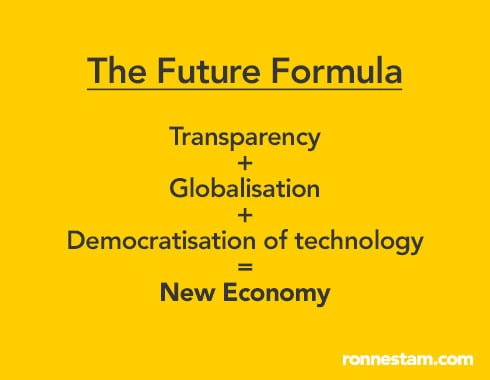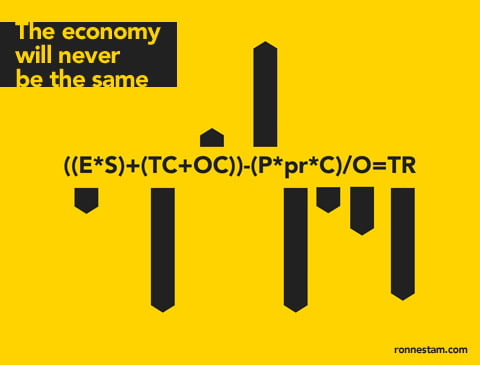
Internet has swept over the world as a hurricane since it was reinvented by Tim Berners Lee in the beginning of the ninties. This new superpowered machine that hasn't stopped since has in a sense turned everything we knew up side down. Now, more than 20 years later, we're online 24/7, we have access to practically any kind of information within seconds and humans and the internet are slowly becoming one.
The drivers of disruption: Transparency, globalisation and democratisation of technology
Transparency
Google anything. Tweet anything. Compare anything. Review anything. Share anything. Find anything. Like anything. Hate anything. What we're facing, or even have entered, is a world where the consumers are in total control. In a world where all information is accessible on the fly. Consumers share experiences on comparison sites, social networks, Personal blogs and more. People even post sites about brands they like and dislike. They way we access all this information will of course speed up due to mobile access. Smartphone has been in our pockets just over 5 years. In other words, most people are still getting aquatinted to being constantly online. When people are exposed to new technologies it usually takes 10 to 15 years before they are fully adapted. This means we've only started to see what 24/7 access means to to business worldwide.
Globalisation
If you ask an industry leader he'll say that we've had a global economy for quite some time now. However, that's not really true. We have had a global B2B economy that's been driven by production. The last couple of years services has been added to the globalisation scope. But the really big change is happening right now - we're shopping globally. So far we're limited to shopping digital services and some special objects that cant be found in our own markets. But as this trend continues we'll slowly see a change that will impact us all. As marketing becomes global we'll see how shopping becomes global. There's simply no need for a local middle hand anymore. This drives competition on a massive scale.
Democratisation of technology
Nothing can be owned. The only competitive edge you’ll have in the future is creative execution. Consumers of tomorrow might try out relations because of monopoly. However, it’s a very risky position to take as we’ll be open to switch the second a new player comes along. And as I stated above – the democratization of technology will drive change, so staying ahead will be harder and harder. Instead focus on building fans through your creative execution. How do you package your products and services. How do you communicate. How do you entertain us. How do you stay fun to be with. How can you make our day better. Focus on the values that makes us talk about your brand – in a positive way.Transparency + globalisation + Democratisation of technology = A new economy.A new economy - what is a new economy?

The future equation and why the economy will shrinkFirst a question: Whats the difference between the old economy and the new one?Old economyOwner, employees and their salaries, technology, product, consumerO = OwnerE = EmployeesS = SalaryTC = Cost of TechnologyP = Number of Productspr = Price of productC = CustomersTR = Total Revenue per owner((E*S)+TC)-(P*pr*C)/O=TRCost of technology is falling rapidlySalaries stays the sameReal costs are going upTotal revenue will be gone.
In the economy as we know it
In the old economy, the economy as we know it, companies have mostly been owned by few major stockholders and the employees have been just that, employees. One business that has differed from this is different areas of consulting and this is due to the fact that without actually rewarding consultants enough the risk is that they leave. However, most in most other business areas you require tons of money to even get started. On top of this you also need tons of employees.(100x360000+30000000)-(10x2900x2100000)/10=66000000-210000000=144000000/10=14400000 Profit equals 14,4 million per owner. Salary stays the same for the employees.(10x360000+380000)-(10x4x100000)/4=3980000-4000000/10=20000(100x360000+250000)-(10x4x2100000)/100=(36250000-84000000)/100=477500In this scenario. The 100 journalists free themselves and use new, democratized technology and produce the same amount of products, but sell them for SEK 4 instead. This leaves them with the same salary, but a profit of 477500 each which equals ~47.7 millions. In this shift of production almost 100 million vanished. This is the effect of democratization of technology.Same salary, ow investor, no owner.Number of employees, cost of technology, price of product and nr of customers.100 employees produced 1 product that was sold to 100000 consumers and generated a profit for 1 owner.New Economy100000 consumers product 100000 products that generate a profit for 100000 owners.Basically. A newspaper yesterday needed expensive technology that no journalist themselves could buy. So one rich guy paid for it and hired journalists to produce content that that one journalist then sold to consumers.In the old economy few producers made sure the margins were high and salaries low and as a result the profits hit the roof.In the new economy tons of producers using cheap technology will ensure that the margins are non existing and profits low as a result. However, those journalists will still earn their money, but what disappears is that margin and the profits that go to that one owner.
To sum up. What our future economy will look like within the next 50 years.
1. We'll all be entrepreneurs.Over the next fifty years we'll see how large corporations disappears as the world is becoming digitalized. You, me and everyone else will have access to tools that allows us to create both of and online products in our homes, a global market and access to network that enables us to outsource what we do not master ourselves. We'll all produce things at home that we sell to cover either some or all of our own expenses.2. Most things will cost next to nothing.The markets will be swarmed with products. You'll be able to print yourselves whatever you can and cannot think off. Even houses. The technology to produce and sell these things will cost near to nothing and as a result we won't have to pay for it either.3. Food will stay cheap but not cheap enough!Even though we won't like it we'll see how even food becomes digitalized. This is in one sense a good thing since it will stay cheap. However, we'll also have more poor people and they won't be able to pay for it anyway.4. Less people will grow rich by paying other people to do their dirty works.5. Our future will be jobless.Whatever business you're in you'll see more and more robots. Foxconn, the worlds largest provider of computer components, delivering stuff for among others Apple, Sony, Nokia and more, are growing the number of robots used in production from 10000 today to more than 1 million robots in 2014. If you're a human being - get ready to be replaced by robots.6. Digitalization will disrupt every existing business model out there on a long term basis.Today industries like music, books, movies, games have already seen their business models getting disrupted by technology. However, in the future you can expect just about every industry out there to be disrupted as we start to share more and more things online, as 3D printing goes mainstream and as transparency and globalisation rules.7. The stock markets will cease to exist as we know them.The stock market will not work in the future. At least not localized ones.8. Globalisation will lead to ultra localisation.Remember when you could travel to New York or London and actually find things that you couldn't find back home. Well, today it's like travelling to another part of your own city. The skylines differ but the shops on the streets carry the same things. People all over the world will get pretty darn tired of this and call for a change. As the world goes global you've gotta look for your local strength. What can people experience in your country that they cannot experience anywhere else in the world. That's where the future business lies in a connected globalized world.9. Products will be on demand.Warehouses will be a thing of the past. In the future gigantic robotic factories will be prepared to produce exactly the customized product that you ordered online the second you click on that buy button. They'll be shipped over night and be ready to use the day after.10. Everything will be socially enhanced.Even though it's not a good sign it's still a sign. Spotify launched a new partnership with Facebook the other day leading to the fact that you cannot even use Spotify unless you sign up with your Facebook account. Behind this business decision is of course the fact that Spotify wants you to socially enhance their business by automatically spread the word about Spotify everytime you press play. This is just the beginning - in the future everything will be socially enhanced in some way.11. The economy will shrink.Finally as this post suggests - the economy will never ever be the same. As Jeff Jarvis wrote: "Our new economy is shrinking because technology leads to efficiency over growth".


